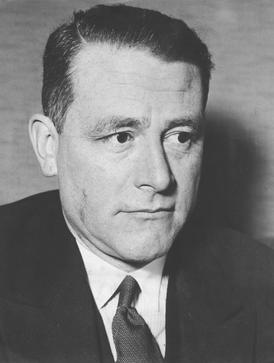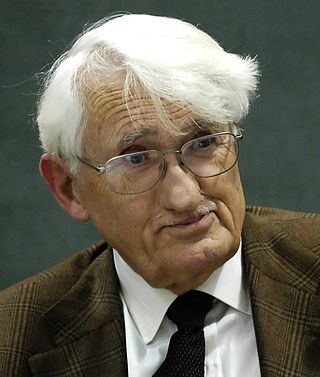Related Research Articles

The Weimar Republic, officially known as the German Reich, was a historical period of Germany from 9 November 1918 to 23 March 1933, during which it was a constitutional republic for the first time in history; hence it is also referred to, and unofficially proclaimed itself, as the German Republic. The period's informal name is derived from the city of Weimar, which hosted the constituent assembly that established its government. In English, the republic was usually simply called "Germany", with "Weimar Republic" not commonly used until the 1930s. The Weimar Republic had a semi-presidential system.

The Basic Law for the Federal Republic of Germany is the constitution of the Federal Republic of Germany.

Carl Schmitt was a German jurist, political theorist, and prominent member of the Nazi Party.

The president of Germany was the head of state under the Weimar Constitution, which was officially in force from 1919 to 1945, encompassing the periods of the Weimar Republic and Nazi Germany.

Hans Kelsen was an Austrian jurist, legal philosopher and political philosopher. He was the principal architect of the 1920 Austrian Constitution, which with amendments is still in operation. Due to the rise of totalitarianism in Austria, Kelsen left for Germany in 1930 but was forced out of his university post after the Nazi seizure of power in 1933 because of his Jewish ancestry. That year he left for Geneva and in 1940 he moved to the United States. In 1934, Roscoe Pound lauded Kelsen as "undoubtedly the leading jurist of the time". While in Vienna, Kelsen met Sigmund Freud and his circle, and wrote on social psychology and sociology.
Karl Dietrich Bracher was a German political scientist and historian of the Weimar Republic and Nazi Germany, born in Stuttgart. During World War II, he served in the Wehrmacht and was captured by the Americans while serving in Tunisia in 1943. Bracher was awarded a Ph.D. in the classics by the University of Tübingen in 1948 and subsequently studied at Harvard University from 1949 to 1950.Bracher taught at the Free University of Berlin from 1950 to 1958 and at the University of Bonn since 1959.

Rechtsstaat is a doctrine in continental European legal thinking, originating in German jurisprudence. It can be translated into English as "rule of law", alternatively "legal state", state of law, "state of justice", or "state based on justice and integrity". It means that everyone is subjected to the law, especially governments.
In American law, the unitary executive theory is a Constitutional law theory according to which the President of the United States has sole authority over the executive branch. It is "an expansive interpretation of presidential power that aims to centralize greater control over the government in the White House". The theory often comes up in jurisprudential disagreements about the president's ability to remove employees within the executive branch; transparency and access to information; discretion over the implementation of new laws; and the ability to influence agencies' rule-making. There is disagreement about the doctrine's strength and scope, with more expansive versions of the theory becoming the focus of modern political debate. These expansive versions are controversial for both constitutional and practical reasons. Since the Reagan administration, the Supreme Court has embraced a stronger unitary executive, which has been championed primarily by its conservative justices, the Federalist Society, and the Heritage Foundation.

Jack M. Balkin is an American legal scholar. He is the Knight Professor of Constitutional Law and the First Amendment at Yale Law School. Balkin is the founder and director of the Yale Information Society Project (ISP), a research center whose mission is "to study the implications of the Internet, telecommunications, and the new information technologies for law and society." He also directs the Knight Law and Media Program and the Abrams Institute for Free Expression at Yale Law School.
Carl Joachim Friedrich was a German-American professor and political theorist. He taught alternately at Harvard and Heidelberg until his retirement in 1971. His writings on state and constitutional theory, constitutionalism and government made him one of the world's leading political scientists in the post-World War II period. He is one of the most influential scholars of totalitarianism.
Defensive democracy is a term referring to the collection of laws, delegated legislation, and court rulings which limit certain rights and freedoms in a democratic society in order to protect the existence of the state, its democratic character and institutions, minority rights, or other aspects of the democratic system. The term is related to a conflict that may emerge in a democratic country between compliance with democratic values, particularly freedom of association and the right to be elected, and the goal of preventing anti-democratic groups and persons from abusing these principles.

Constitutional patriotism is the idea that people should form a political attachment to the norms and values of a pluralistic liberal democratic constitution rather than to a national culture or cosmopolitan society. It is associated with post-nationalist identity because, while it is seen as a similar concept to nationalism, the attachment is based on the constitution rather than on a national culture. In essence, it is an attempt to re-conceptualize group identity with a focus on the interpretation of citizenship as a loyalty that goes beyond individuals' ethnocultural identification. Theorists believe this to be more defensible than other forms of shared commitment in a diverse modern state with multiple languages and group identities. It is particularly relevant in post-national democratic states in which multiple cultural and ethnic groups coexist. It was influential in the development of the European Union and a key to Europeanism as a basis for multiple countries belonging to a supranational union.

Cornelius Adrian Comstock Vermeule is an American legal scholar who is currently the Ralph S. Tyler Professor of Constitutional Law at Harvard Law School. He is an expert on constitutional and administrative law, and, since 2016, has voiced support for Catholic integralism. He has articulated this into his theory of common-good constitutionalism.

The political philosophy of Immanuel Kant (1724–1804) favoured a classical republican approach. In Perpetual Peace: A Philosophical Sketch (1795), Kant listed several conditions that he thought necessary for ending wars and creating a lasting peace. They included a world of constitutional republics by establishment of political community. His classical republican theory was extended in Doctrine of Right (1797), the first part of Metaphysics of Morals. At the end of the 20th century Kant's political philosophy had been enjoying a remarkable renaissance in English-speaking countries with more major studies in a few years than had appeared in the preceding many decades.
A state of exception is a concept introduced in the 1920s by the German philosopher and jurist Carl Schmitt, similar to a state of emergency but based in the sovereign's ability to transcend the rule of law in the name of the public good.

Ernst-Wolfgang Böckenförde was a German legal scholar and a justice on Germany's Federal Constitutional Court. He was a professor at the University of Freiburg and the author of more than 20 books and 80 articles dealing with legal and constitutional theory, as well as political theory, political philosophy and Catholic political thought. Böckenförde was considered a member of the Ritter School.

Otto Kirchheimer (German:[ˈkɪʁçˌhaɪmɐ]; 11 November 1905, Heilbronn – 22 November 1965, Alexandria, Virginia was a German jurist of Jewish ancestry and political scientist of the Frankfurt School whose work essentially covered the state and its constitution.
The rule according to a higher law is a statement which expresses that no law may be enforced by the government unless it conforms with certain universal principles of fairness, morality, and justice. Thus, the rule according to a higher law may serve as a practical legal criterion to qualify the instances of political or economical decision-making, when a government, even though acting in conformity with clearly defined and properly enacted law, still produces results which many observers find unfair or unjust.
Constitutionalism is "a compound of ideas, attitudes, and patterns of behavior elaborating the principle that the authority of government derives from and is limited by a body of fundamental law".
The liberal democratic basic order is a fundamental term in German constitutional law. It determines the unalienable, invariable core structure of the German commonwealth. As such, it is the core substance of the German constitution. Building upon more general definitions of liberal democracy, the term has a specific legal meaning in Germany and is part of the German system of a Streitbare Demokratie that bans attempts to dismantle the liberal democratic basic order by what German authorities refer to as "enemies of the Constitution" or "extremists".
References
- ↑ R. W. Kostal (2019). Laying Down the Law: The American Legal Revolutions in Occupied Germany and Japan. Harvard University Press. pp. 67–77. ISBN 9780674243828.
- ↑ R. W. Kostal (2019). Laying Down the Law: The American Legal Revolutions in Occupied Germany and Japan. Harvard University Press. p. 77. ISBN 9780674243828.
- ↑ Markus Thiel (2016). The 'Militant Democracy' Principle in Modern Democracies. Taylor & Francis. ISBN 9781317024033.
- ↑ Daniela Hacke, ed. (2004). Militant Democracy. Eleven International Publishing. p. 1. ISBN 9077596046.
- ↑ Oren Gross; Fionnuala Ní Aoláin (2006). Law in Times of Crisis. Cambridge University Press. p. 38. ISBN 9781139457750.
- ↑ Jan-Werner Muller (2011). Contesting Democracy. Yale University Press. ISBN 9780300180909.
- ↑ David S. Clark (2022). American Comparative Law: A History. Oxford University Press. p. 356. ISBN 9780195369922.
- ↑ Rensmann, Thilo (November 2011). "Munich Alumni and the Evolution of International Human Rights Law". European Journal of International Law. 22 (4): 973–991. doi: 10.1093/ejil/chr073 . Retrieved 30 October 2022.
- ↑ David S. Clark (2022). American Comparative Law: A History. Oxford University Press. p. 356. ISBN 9780195369922.
- ↑ David S. Clark (2022). American Comparative Law: A History. Oxford University Press. p. 356. ISBN 9780195369922.
- ↑ Udi Greenberg (2016). The Weimar Century: German Émigrés and the Ideological Foundations of the Cold War. Princeton University Press. p. 199. ISBN 9780691173825.
- ↑ William E. Scheuerman (1999). Carl Schmitt: The End of Law. Rowman & Littlefield. p. 176. ISBN 9780847694181.
- ↑ Oona A. Hathaway; Scott J. Shapiro (2017). The Internationalists: How a Radical Plan to Outlaw War Remade the World. Simon & Schuster. pp. 292–293. ISBN 9781501109867.
- ↑ Werner Sollors (2014). The Temptation of Despair: Tales of the 1940s. Harvard University Press. p. 173. ISBN 9780674416321.
- ↑ Werner Sollors (2014). The Temptation of Despair: Tales of the 1940s. Harvard University Press. p. 174. ISBN 9780674416321.
- ↑ Udi Greenberg (2016). The Weimar Century: German Émigrés and the Ideological Foundations of the Cold War. Princeton University Press. p. 199. ISBN 9780691173825.
- ↑ Werner Sollors (2014). The Temptation of Despair: Tales of the 1940s. Harvard University Press. p. 156. ISBN 9780674416321.
- ↑ Ludger Pries; Pablo Yankelevich (2018). Scientists as Refugees, Émigrés and Return-Migrants. Springer International Publishing. p. 117. ISBN 9783319992655.
- ↑ George E. Gordon Catlin (2021). Systematic Politics. Taylor & Francis. ISBN 9781000349283.
- ↑ Ludger Pries; Pablo Yankelevich (2018). Scientists as Refugees, Émigrés and Return-Migrants. Springer International Publishing. p. 118. ISBN 9783319992655.
- ↑ Werner Sollors (2014). The Temptation of Despair: Tales of the 1940s. Harvard University Press. p. 156. ISBN 9780674416321.
- ↑ Werner Sollors (2014). The Temptation of Despair: Tales of the 1940s. Harvard University Press. p. 153. ISBN 9780674416321.
- ↑ András Sajó; Michel Rosenfeld (2012). The Oxford Handbook of Comparative Constitutional Law. OUP Oxford. p. 107. ISBN 9780199578610.
- ↑ Andrea Bonime-Blanc (2019). Spain's Transition To Democracy. Taylor & Francis. p. 107. ISBN 9781000312850.
- ↑ Secher, H. P. (June 1967). "Max Weber's Political Ideas in the Perspective of Our Time. By Karl Loewenstein. (Amherst: The University of Massachusetts Press, 1966. Pp. xii, 104. $2.00.)". American Political Science Review. 61 (2): 505–506. doi:10.1017/S0003055400135713. ISSN 0003-0554. S2CID 197681944.